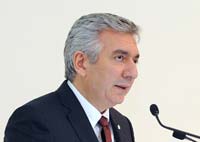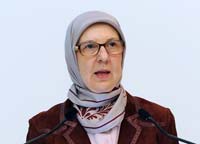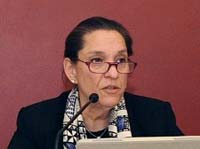News
ICI Assembly Hosts Minister of Family and Social Policies Sema Ramazanoğlu in March’s Meeting
- 23.03.2016
- News

On Wednesday, March 23, Istanbul Chamber of Industry (ICI) Assembly convened in Odakule General Assembly Hall for the monthly assembly meeting themed “Social Policies in a Changing World, the Increasing Role of Women in Production, and the Importance of Female Entrepreneurs for Our Economy”. Erdal Bahçıvan, ICI Chairman of the Board of Directors, gave the opening speech at the meeting where Minister of Family and Social Policies Sema Ramazanoğlu made remarks on current debates.

ICI Chairman Erdal Bahçıvan
The meeting was opened by Zeynep Bodur Okyay, ICI President of Assembly, and ICI Chairman of the Board of Directors Erdal Bahçıvan stressed during his speech that female entrepreneurs comprised only 15.7% of Turkish entrepreneurs. He pointed out that a holistic and sustainable development could only be possible through the integration of women into labor force and as entrepreneurs, and continued: “We will enjoy a more peaceful atmosphere in both Türkiye and around the world when the obstacles preventing women’s participation in economic and social life are overcome.” Bahçıvan emphasized that the majority of women are denied educational opportunities:
“In Türkiye, female employment participation rate is around 30% and we have a low ranking among the OECD members. Education represents the primary means to overcome the inequalities against women. Relevant studies anticipate a 2% increase in GDP if we could make use of women’s skills more effectively.”

Minister of Family and
Social Policies
Sema Ramazanoğlu
During her speech, Sema Ramazanoğlu mentioned the significant work they were carrying out to ensure increased number of female CEOs and executive board members and told that female entrepreneurs contribute to the transformation of financial agencies and the culture. Minister Ramazanoğlu told that women enjoy a special power with their sensibility and intelligence that can transform their time and the world.
ICI Assembly meeting for March started with the speech by Zeynep Bodur Okyay, ICI President of Assembly. Okyay condemned the recent terrorist attacks and then stressed that the ICI Assembly meeting discussed the role of women for the first time. Her remarks were briefly as follows:

ICI President of Assembly
Zeynep Bodur Okyay
“Businesswomen achieve great successes. The past decade saw remarkable steps taken to ensure female participation in the economy. Of course, we still have much to do. Last year, Türkiye fell to rank 130th in the World Economic Forum’s gender equality report. In Türkiye, only 3.1% of publicly traded companies include female CEOs. In my view, a female executive quota of 20% should be practiced by boards of directors. There are successful Turkish business women around the world. They show us what Turkish women could achieve when they are offered opportunities. I think that industrialist female entrepreneurs have a special status. Female entrepreneurs comprise 8% of Turksh entrepreneurs while this rate reaches to 30% in Germany. Türkiye was a pioneer in the enfranchisement of women and female revolution. We can also become one of the pioneers of the second female revolution in ensuring female participation in the economy.”
Erdal Bahçıvan, ICI Chairman of the Board of Directors, started his remarks by condemning the recent terrorist attacks in Türkiye and Belgium. “I extend my condolences for those who lost their lives during the terrorist attacks in Türkiye and Brussels and wish the wounded a quick recovery,” said Bahçıvan, stating that terrorism is now a global problem instead of that of a single region.

He commented on the ICI Assembly meeting’s theme and pointed out that the institution of family, the focus of current social policies and pillar of social peace, was getting weaker. According to Bahçıvan, collapse and dissolution of the unity of family will bring about social problems. He mentioned a direct relationship between economic-humanitarian development of a country and women’s participation in social and business life, and continued: “Women in developed countries enjoy serious achievements while those in developing countries continue to experience problems. Relevant studies anticipate a 2% increase in GDP if we could make use of women’s skills more effectively.”
Bahçıvan drew attention to the underwhelming picture regarding female entrepreneurs in Türkiye: “According to TurkStat 2014 survey results, female entrepreneurs comprise only 15.7% of Turkish entrepreneurs. A holistic and sustainable development is only possible by integrating women into the economic system as both labor force and entrepreneurs. I sincerely believe we will enjoy a more peaceful Türkiye and world when the obstacles preventing women from participating in economic and social life are overcome.”
Bahçıvan reported that 64.4% of Turkish women aged 25+ had an educational background at the primary school level, which adversely affected female employment, and Türkiye fell way behind the developed countries in terms of female participation in the workforce. As the majority of women lacked educational opportunities, they could not participate in employment, decision-making mechanisms or politics, and often they had to endure domestic violence, Bahçıvan stressed. Bahçıvan: “Education represents one of the primary means that may overcome gender inequalities against women and unlock a social transformation. We are aware that Türkiye has made some progress regarding female employment and participation in labor force. However, global labor participation rates for women are around 30% and Türkiye remains behind the OECD members in this regard.”
Bahçıvan noted that we lived in a “deeply unequal and unfair” world and continued: “According to the Organization for Economic Cooperation and Development (OECD), the average income of the richest 10% in the OECD members is approximately nine times greater than the poorest 10%. A similar fact is reported by the Credit Suisse’s Global Wealth Report 2015. Accordingly, half of the world’s assets are controlled by the richest 1%, whereas the other half of the global population owns less than 1% of the global wealth. Given such inequalities, social policies are tremendously important in protecting the social order and ensuring continuous social peace. Of course, we should not expect the government to take all the steps necessary. Given the limited public resources, non-governmental organizations, associations and foundations in particular, should assume further duties and roles.”
ICI Chairman of the Board of Directors Erdal Bahçıvan passed the floor to Minister of Family and Social Policies Sema Ramazanoğlu, who started her remarks by announcing the goal of social policies. According to Ramazanoğlu, social policies represent efforts that enhance the modern societies’ level of welfare and prevent income inequality, and they particularly aim the disadvantaged groups within the society. Ramazanoğlu stated that they were providing supply-oriented services instead of demand-oriented ones and the ministry was established to operate autonomously in 2011. She mentioned that the government particularly focused on the disadvantaged groups including women, children, the handicapped, senior citizens, veterans, and relatives of martyrs, and they aimed to maintain social welfare.
Citing Plato, Minister Ramazanoğlu said: “We founded our state to make the whole society happy, not to ensure the happiness of one class by compromising that of the others.” Ramazanoğlu further explained that social policies were shaped by the contemporary requirements and 2015 saw social aids worth TRY 28.5 billion distributed in comparison to 2002, which was TRY 1.3 billion. Ramazanoğlu told that girls and senior citizens represent their primary target groups and the Ministry of Family and Social Policies has provided the Syrian refugees with aids for the past 4 years.
She noted the three steps they have taken in the field of social policies as follows: Provision of social aids in a digitalized structure, restructuring of the organization and increasing the penetration of Family Social Support Project. Ramazanoğlu stated that they were working to assign a social consultant to each family and this practice started in those provinces that were exposed to terrorism.
She also stressed their focus on gender equality, noting that it was to the disadvantage of the society if we failed to benefit from the knowledge and skills of women, who represent half of the population.
Ramazanoğlu highlighted the significance of education for women as female employment and entrepreneurship would further strengthen the society. She referred to the significant work they were carrying out to ensure increased number of female CEOs and executive board members and told that female entrepreneurs contribute to the transformation of financial agencies and the culture. Ramazanoğlu re-emphasized that women enjoy a special power with their sensibility and intelligence that can transform their time and the world.
After Ramazanoğlu, Assembly members took the floor and shared their opinions on current debates with the audience.